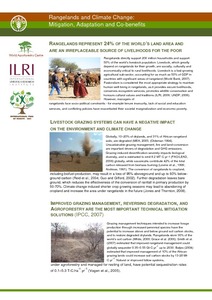Pastoralism 'alive and well' in Africa
Ian Scoones from the Institute of Development Studies and the Future Agricultures Consortium reflects on some key issues emerging from a recent conference on the future of pastoralism in Africa. His overwhelming conclusion: Pastoralism is "alive and well" in some parts of the continent. But there are downsides: constraints caused by pressures on land, as well as recurring conflicts. This leads to a division between those who are "really making it" and those who are "really struggling." This poses major policy issues at the two ends of these extremes.
Pastoralist futures in Africa a balance between traditions and opportunities
ILRI's Augustine Ayantunde reflects on the recent conference in Addis Ababa on the future of pastoralism in Africa. He draws attention to the two major conference strands - on one side, the optimists, on the other 'doom and gloom.' One thing is clear, it is not really possible to generalise across regions. He concludes by suggesting that the future will lie in pastoralist communities being able to take advantage of present opportunities while also taking care of their traditions.
Identification of agro-pastoralists adaptation strategies to climate variability: A case study in Mopti-Mali
Identification of agro-pastoralists adaptation strategies to climate variability: A case study in Mopti-Mali
Pastoral issues must be part of ILRI’s research agenda into the future
Ian Scoones, Science Adviser to ILRI reflects on the recent conference on the future of pastoralism and the work of ILRI in this area. He argues that pastoralism ‘must be part of ILRI’s research agenda into the future.” He identifies two promising areas: First, to engage in technical research on production issues in pastoral areas and pastoral systems - to sustain the enormous economic potential of such areas. Second, to support the broader area of innovation.
Pastoral systems and cultures in transition
Jan de Leeuw from ILRI reflects on the recent conference in Addis Ababa on the future of pastoralism in Africa. He concludes that pastoral systems in Africa are very much in transition. He notes that external influences on pastoralism (education, religion, land rights etc) are much more visible than in the past; the "full mobility" pastoralism that we knew is changing.
Pastoralists in Kenya and Sudan discover new markets for camels
Speaking in the margins of a recent conference on the future of pastoralism in Africa, Hussein Makmoud from Pwani University College in Kenya talks abut the growing trade in camels in northern Kenya and southern Sudan and how these new markets are contributing to pastoralist livelihoods in the regions. The Addis Ababa conference (21-23 March 2011) was organized by the Future Agricultures Consortium with Tufts University.
Repeated droughts and hazards are the real challenge for Pastoralist communities
Jan de Leeuw from ILRI reflects on the impacts of droughts and hazards on pastoral communities in Africa. He argues that pastoralists are often well-adapted to short term hazards and droughts. A single-season drought weakens livestock and communities. When rains fail repeatedly however, the problems start, and the impacts can be long-lasting. He was talking in the margins of the recent conference in Addis Ababa on the future of pastoralism in Africa. The Addis Ababa conference (21-23 March 2011) was organized by the Future Agricultures Consortium with Tufts University.
There are many futures for pastoralism in Africa
Adrian Cullis from FAO Ethiopia reflects on the recent conference in Addis Ababa on the future of pastoralism in Africa. The event's fundamental take home message is that "there is a future for pastoralism in Africa." However, it looks like there will be different futures and different forms of pastoralism - with winners and losers. He also outlines the work FAO does in this area, and comments on some issues like gender and productivity issues (of rangelands, of livestock) that received insufficient attention in the meeting.



